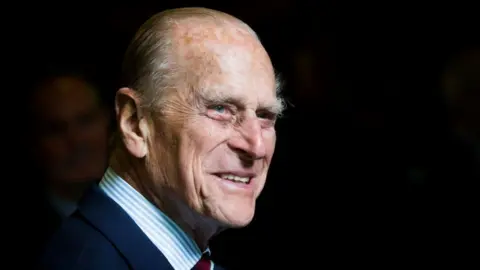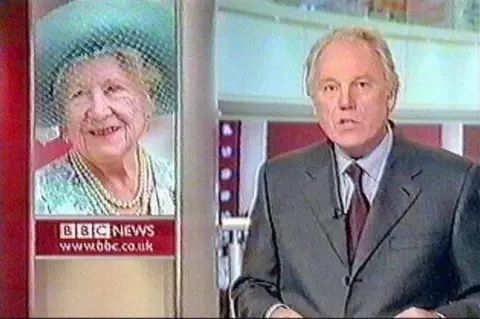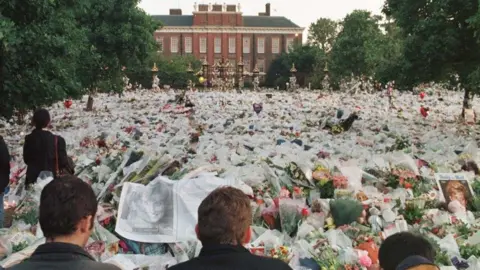Prince Philip: Coverage of royal death poses quandary for BBC
 PA Media
PA MediaThe 109,741 complaints the BBC has received over its coverage of the Duke of Edinburgh's death has set a new record. Yet it is not the first time the BBC has been criticised for its coverage of a royal death.
In 2002, a number of newspapers expressed fury about the BBC following the announcement of the death of the Queen Mother. It was accused of lacking respect and deference. One particular target was the newsreader, Peter Sissons who wore a burgundy rather than a black tie when reporting the news.
The day after, the BBC's future deputy director general Mark Byford gathered editors and presenters in a room to discuss the reaction. Nineteen years on, he feels, the essential issue has not changed.
"It's always a moment when critics are looking out for you, but the test for me was not how the newspapers react but much more important was how the public reacts," he says.
There were, by the end of the week, around 2,000 complaints but the vast majority were unhappy that programmes such as Casualty had been moved to make way for programmes about the Queen Mother. However, 130 people felt some of the coverage was insensitive.
Looking back, Mark Byford feels it was "slightly shaky" at first. "How you announce it and how you react in the first hour is crucial," he says. "It was a bit rolling news, it wasn't awful but it didn't quite have the grace and tone. It's a moment for reflection and remembrance."

The criticism was fuelled by a belief that the BBC had downgraded its plans in the months before. Lorraine Heggessey, the head of BBC One at the time, had talked about how there were discussions about plans for the coverage to ensure it was "in tune with the times".
The later clarification that this was an ongoing discussion about tone, rather than the quantity of coverage, did little to stem the criticism.
Nevertheless, that question about being 'in tune with the times' did reflect a wider debate that had been taking place. The death of Princess Diana in 1997 and the extraordinary public reaction had been a watershed moment.
In 1952, on the announcement of the death of King George VI, the BBC fell silent apart from news bulletins and the Shipping Forecast, a silence that was then followed by sombre music and poetry readings.
The death of Princess Diana was marked by rolling news. This was a time just before the launch of the BBC's News Channel when continuous TV news was, in the UK, a relatively new experience.
The unfolding events did not just reveal the shock and sadness of millions but seemed to many to reflect a change in the mood of the nation. Britain suddenly appeared to be a more emotional, demonstrative society with a rather less reverential attitude to the royal family; the age of mournful music and poetry readings seemed to be over.
Rather than setting the tone and leading the mourning, the task for the BBC was to reflect the "national mood". Judging that, of course, is tricky.
 PA Media
PA MediaIn 2002 Mark Byford was facing critical headlines about a perceived lack of respect and hundreds of complaints saying there was too much coverage.
"We immediately commissioned independent research from Ipsos-Mori to track the popular mood, and it showed that the vast majority of the public thought our coverage was about right. Understanding the complaints matters but we shouldn't be driven by it."
For a significant number of viewers, replacing the final of MasterChef with programming celebrating the life of Prince Philip was the wrong decision. Quite how many would have complained if the BBC had done the opposite is the unanswered question.
What is also interesting is how many older viewers have complained. Traditional "linear" TV has been a reliable friend during months of lockdown, and while younger viewers have embraced streaming around 20 million of us are still watching at peak time each evening. Schedules, even in an age of YouTube, iPlayer and Netflix, still matter.
It is also worth mentioning that, in these days of online complaints forms, it is rather easier to register a complaint than it was in the era of trying to get through to the BBC switchboard. Indeed, some people contacted the BBC to complain that the BBC was making it too easy to complain.
Nineteen years on from overseeing the coverage of the death of the Queen Mother, Byford still feels it is right that the BBC merges its TV and radio channels at these moments.
"The BBC is the national broadcaster, it is owned by the public and as a national broadcaster it has different responsibilities. People complain because the BBC still matters and you need to understand those complaints and learn from, but I am absolutely clear that at the time of the announcement, as the national broadcaster, it is right to bring all its services together."


Follow us on Facebook, or on Twitter @BBCNewsEnts. If you have a story suggestion email [email protected].
